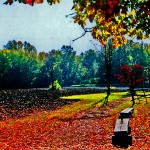September/October 2015 Poetry Feature: Six Indiana Women Poets
It’s no secret that, like other marginalized groups in our country, women struggle to get their voices heard in poetry journals and anthologies. While the publishing world has made inroads toward being more inclusive, it is not nearly enough to realign long-held historical and systemic forces that have kept the voices of women at the margins. While I have featured several women poets on The Wabash Watershed during the last twenty-two months, I have also noticed a disturbing trend: several women poets whom I have invited for individual features could not participate, given competing commitments. This is not unusual when one studies the history of women’s literature; often called upon to inhabit multiple roles within their professional, creative, and family lives, some women writers struggle to achieve the most generative balance.
Thus, on a late-night walk some months ago, it occurred to me to offer a “mini-anthology” of Indiana women poets as a way both to make participating less cumbersome for some poets than, say, the commitment of embarking on a full-length feature and to make public an array of powerful female voices in our state. Through such a public display, it is my hope that we will not only seek out more of the stunning work of the following participants but see this feature as just one step toward encouraging the publication and support of more women poets throughout our state.
No anthology is inclusive. And—Lord knows—this mini-anthology of six Indiana women poets is not meant to be, nor is it even conceived to be representative of the multiplicity of female voices within our borders. I selected the poets (as well as a few others who could not participate) based on both the sheer power of their work and the good fortune that I had come to know their poetry more intimately during my tenure as Indiana Poet Laureate.
The number of poets featured precluded me from embarking on my standard in-depth personal interview with each writer. Instead, I offered the poets a brief (and at points, admittedly quirky!) survey of eight questions. I call it “The Infinite Eight” in light of the fact that the number eight (8) is often referred to as representing infinity since, visually, it is a number that is unbroken. I liked this as a metaphor. First, I wanted to suggest that women’s voices will never be completely silenced or “broken.” Second, the questions and answers are meant to give us a glimpse into the life of each poet and serve as a springboard into the “infinite” possibilities that the poetry and processes of these featured poets offer.
What you’ll find below, then, are a poem from each poet, a brief biographical note, a photo, and the poets’ answers to the survey. I am honored that these six featured poets shared their amazing work with The Wabash Watershed.
George Kalamaras
Poet Laureate of Indiana
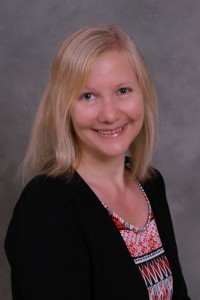 Janine Harrison, M.A., M.F.A. teaches creative writing at Purdue University Calumet and leads the Indiana Writers’ Consortium. She lives with her husband, fiction writer Michael Poore, and daughter, Jianna, in Highland. Janine is finishing her first poetry collection, The Weight of Silence. Her work has been or will be published in A&U, Blotterature, CREDO, Heartscapes, The Mom Egg (“Vox Mom”), Skylark, and Veils, Halos, and Shackles: International Poetry on the Oppression and Empowerment of Women.
Janine Harrison, M.A., M.F.A. teaches creative writing at Purdue University Calumet and leads the Indiana Writers’ Consortium. She lives with her husband, fiction writer Michael Poore, and daughter, Jianna, in Highland. Janine is finishing her first poetry collection, The Weight of Silence. Her work has been or will be published in A&U, Blotterature, CREDO, Heartscapes, The Mom Egg (“Vox Mom”), Skylark, and Veils, Halos, and Shackles: International Poetry on the Oppression and Empowerment of Women.
Isolés Chen (Haitian Creole: Stray Dogs) Dogs in Haiti could all be one animal: medium structure, medium brown. I would say like ruins of pyramids, disintegrating staircase spines, broken column ribs, but I saw no bygone grandeur on the island during my short stay. Dogs in Haiti have rusty corrugated metal ribcages, uneven stairstep spines, decaying palm frond ears folding forward under their own weight. On earthquake-crumbled streets they forage as many Haitians do, rejected and stepped on, yet brown eyes are prayerful: pet me, feed me, don’t send me back to battle again tonight . . . Whether in the rural west or Port-au-Prince, after darkness descends packs of dogs become phantasms of corrupt governments and revolutionaries, of armies and ravaged innocents, growling both as predator and prey, within a slate-gray history. A last yowl punctures the late night and I, who lie awake, mourn a starving brown dog. A mother dog with a litter roams the compound safe within stone walls. We are told DO NOT FEED THE DOGS. A psych prof, Betty from Boston, does anyway. She can’t help herself. Otherwise, we see the bitch in the kitchen rummaging through a five-gallon bucket of trash— for sustenance to nurse her small brown train. We suspect our daily leftovers are saved for a silent community of strangers who visit servants at midnight. Once, my husband found a boy in a chair at the end of a hall sitting in darkness. Guesthouse dogs are lucky, unlike the curs, the isolés chen, whose pleas continually curdle balmy air.
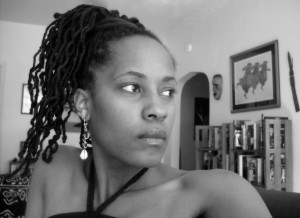 Allyson Horton is a native of Indianapolis. She graduated from Indiana University and received her MFA in creative writing from Butler University. Her poetry has been published in the anthology Turn the Page and You Don’t Stop! Sharing Successful Chapters In Our Lives With Youth (Say It Loud! Readers and Writers Series, 2006). Her work will be featured in the upcoming anthology, It Was Written (Minor Arcana Press). Currently, she teaches at Butler University and works within the IPS school system.
Allyson Horton is a native of Indianapolis. She graduated from Indiana University and received her MFA in creative writing from Butler University. Her poetry has been published in the anthology Turn the Page and You Don’t Stop! Sharing Successful Chapters In Our Lives With Youth (Say It Loud! Readers and Writers Series, 2006). Her work will be featured in the upcoming anthology, It Was Written (Minor Arcana Press). Currently, she teaches at Butler University and works within the IPS school system.
Understanding Eve I mean—to put it all on Satan might be a little unfair. Considering the fact that a woman has her own mind. Her own set of ribs. Her own eyes for examining both sides of a fig leaf. Nose for sensing fire in a single drop of rain. Her own lips for speaking when asked for directions. Brain for deciding left or right. A body bearing its own garden of lush fruits. And besides His, her own breath, coursing through each flared nostril. Own cravings: scratching at the surface of her earth brown rainbow skin. Own teeth perfect for chewing the fat with a serpent. Her own seeds planted in hidden places. Her own dark voices, caprices, coiling inside. Her own solutions to curing mass ignorance, climate change, pre-inflation theories, and doubling the learning capacity of children. Her own reasons for not eating the waxed skin of an apple. And, wouldn’t you say, her own ideas on how to get to the core.
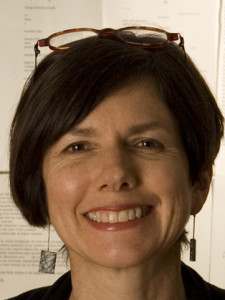 Karen Kovacik, Professor of English at IUPUI, lives in Indianapolis and is the author of Metropolis Burning (Cleveland State, 2005), Beyond the Velvet Curtain (Kent State, 2005), and Nixon and I (Kent State, 1998). She also translated Distant Lands: An Anthology of Poets Who Don’t Exist by Polish poet Agnieszka Kuciak (White Pine, 2013) and is editor of the forthcoming anthology of Polish women poets, Scattering the Dark (White Pine, 2016). In 2012-14, she served as Indiana’s Poet Laureate.
Karen Kovacik, Professor of English at IUPUI, lives in Indianapolis and is the author of Metropolis Burning (Cleveland State, 2005), Beyond the Velvet Curtain (Kent State, 2005), and Nixon and I (Kent State, 1998). She also translated Distant Lands: An Anthology of Poets Who Don’t Exist by Polish poet Agnieszka Kuciak (White Pine, 2013) and is editor of the forthcoming anthology of Polish women poets, Scattering the Dark (White Pine, 2016). In 2012-14, she served as Indiana’s Poet Laureate.
Rothko in Warsaw 1 In the museum’s marble pool without water in the clotted nudes of your novice years colors cheap as shoe dye or lipstick I saw you before you were you then came a canvas from ’49 surface flat as the counter in a fabric shop if oak gave way to ochre and bolts of cotton pink, blue, white striped with red blurred at the selvage into light till the night of fugues claimed you and I could see my own death in sepia tunneling through purple full as a forest or the sky 2 I’m back in the world you erased rectangles of ATMs and logos KEBAB SONY KFC landscape of Warhol and Johns that rendered yours invisible You wanted an art of the ephemeral and chance Stalin demanded worker-giants along Marszałkowska but the soldier with granite fieldglasses who once reviewed May Day parades now spies on the whisky bar Pulp Fiction and the virginal teacher, sculpted skirt mid-calf, poses atop a plinth black and green with graffiti 3 “Silence,” you said, “is so accurate” The torn scroll of the Torah black on black unrolls into a future without God the Bund of Dvinsk gone all the burghers and revolutionaries tailors with black thread apothecaries with white pills the heavy bodies of storks burned in their nests 4 When a city is burned to the ground and we who live on feel like bolts of raw cloth when a spirit leaves the world and we feel her presence each time we sit down to tea when the self seems impossible to lift a litany of blanks the logic of grammar gone help us to parse this wall with long pink stripe green rack for beating rugs taxis smearing the leafy park with tan walnut doors of a church carved angels at each hinge for thine is the purple thy blue be done now and at the hour of our red amen
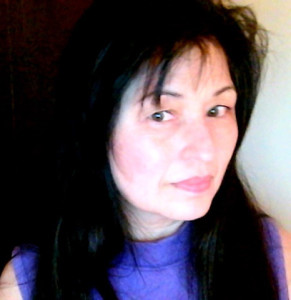 Nancy Chen Long works in Indiana University’s Research Technologies Division and lives in Morgantown. She is the author of Clouds as Inkblots for the War Prone (Red Bird Chapbooks, 2013). She has recent and forthcoming work in Bat City Review, DIAGRAM, Pleiades, Superstition Review, and elsewhere. A collection of her work has been a finalist most recently in the Autumn House Press Poetry Prize, Prairie Schooner Book Prize, Trio House Press Trio Award, and Pleaides Press Editor’s Prize.
Nancy Chen Long works in Indiana University’s Research Technologies Division and lives in Morgantown. She is the author of Clouds as Inkblots for the War Prone (Red Bird Chapbooks, 2013). She has recent and forthcoming work in Bat City Review, DIAGRAM, Pleiades, Superstition Review, and elsewhere. A collection of her work has been a finalist most recently in the Autumn House Press Poetry Prize, Prairie Schooner Book Prize, Trio House Press Trio Award, and Pleaides Press Editor’s Prize.
River is a Verb When Home is Stopgap
Home in a dust bowl. I plunge
both hands in, sieve sand through my fingers
sifting for rock. Confucius,
sitting at the kitchen table, sips gunpowder tea.
Tsk tsk. He pats my hand like a father
of philosophy. Time flows away
like the water in the river, he says. He knows
it’s not the water—it’s the dust that throws me.
I once read a river
never rests. Or maybe it was when one’s home is a river
running dry, each moment is spent bleeding
into the next. Whatever I read has not helped.
Now all of my time is spent sanding
every rock until there is nothing
left but dust. It’s risky to run
a river dry. The full moon might fit inside.
And then where would you be?
In a river bowl with a mouth full
of moon dust.
But Confucius does not judge me.
He knows where the water pools, promises
we’ll visit someday. In my dreams,
I make a home out of mud
from a bog near the mouth of a river.
I am rivered and succulent in my dreams,
work the humus with my whole body.
In my gardens,
sundews and pitcher plants flourish.
Dust is never an option. I have no need to hide.
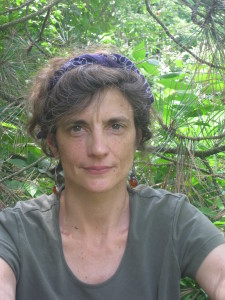 Alessandra Lynch teaches at Butler University. She is the author of Sails the Wind Left Behind (Alice James, 2002), It was a terrible cloud at twilight (Pleiades/LSU, 2008) and Daylily Called It a Dangerous Moment (Alice James, forthcoming). Her poems will appear soon in The Laurel Review, Massachusetts Review, and Michigan Quarterly Review. She is the recipient of a grant from the Indianapolis Arts Council and is a poet-curator for StreamLines, an Indianapolis Waterways Project.
Alessandra Lynch teaches at Butler University. She is the author of Sails the Wind Left Behind (Alice James, 2002), It was a terrible cloud at twilight (Pleiades/LSU, 2008) and Daylily Called It a Dangerous Moment (Alice James, forthcoming). Her poems will appear soon in The Laurel Review, Massachusetts Review, and Michigan Quarterly Review. She is the recipient of a grant from the Indianapolis Arts Council and is a poet-curator for StreamLines, an Indianapolis Waterways Project.
When Frost When frost pressed into the house, glittering, whitening the interior walls—. When air kept icily crossing those rooms—. How my eyes blackened. How my hands filled with sleet. How the stuffed ostrich kept soiling. And the clown-swan on its useless pond. Did the frost get in when I was hanging the doll from a ceiling fixture because it had real human hair and live flowers stitched to its mouth? And it would talk. Or when I lay stiff in my childhood bed, pretending to be a sheet. The strange men coldly circling. Later, I crouched, narrow as a jackal, dumbthroated, haunches trembling behind doors and dumpsters, sick in the violets, near the dull-eyed plush lion under the usual sky with its forgettable color and its stalks dead-straight in the blocky wind, betrothed to what is always leaving—gripping the fiercest flower as it falls apart.
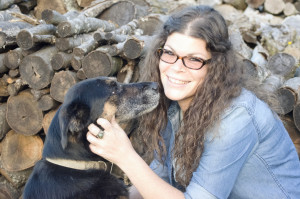 Amy Jo Trier Walker received her MFA in poetry at Columbia College Chicago, and she lives and works on a tree and herb farm in Indiana. She is the author of Trembling Ourselves Into Trees (Horse Less Press, 2015), and her recent work can be found in Forklift, Ghost Ocean, Handsome, inter|rupture, Tinderbox Poetry Journal, and Word For/Word, among others. She is Poetry and Art Editor for Black Tongue Review.
Amy Jo Trier Walker received her MFA in poetry at Columbia College Chicago, and she lives and works on a tree and herb farm in Indiana. She is the author of Trembling Ourselves Into Trees (Horse Less Press, 2015), and her recent work can be found in Forklift, Ghost Ocean, Handsome, inter|rupture, Tinderbox Poetry Journal, and Word For/Word, among others. She is Poetry and Art Editor for Black Tongue Review.
We Hover with the Pleading for Jack Spicer we will carry underground so many lovers grow winter-memory the little parts of us not reached by the industries the blocks weeping high, slow, unwinding birds cormorants singing over Fort Wayne elephants nitrogen’s end will bring no buses and we watch we hover with the trees dying into footprints and the motors come back every map pleading every sparrow pleading the winter-horse to find acres of cold smoke the motors come back pleading the acres like the coast we’ve never been the earthquake we’ve never cracked I never hit the coast always expected to draw insane like water at this depth at this depth we find difficult is too hard eyes kissing, stammering idiots an idiot-ache, so sweet in our mouths trying like children to embrace together in our emptiness as an ear would as an ear would soothe would find a way to speak across strangers across ourselves and this dead starfish its five calls around the earth this other human this other vocabulary we could be let this flatten love we’re prefigured to die and go with the ocean why are the dead our most important when the blue unknown lies down unspoken like love, like nothing
Survey Questions
The Infinite Eight
1. Who is your favorite poet, or who are your favorite poets, and why?
2. Finish this sentence or paragraph: “I’m a poet because . . .”
3. Do you have a particular writing space that you find generative? Where do you most like to write and why?
4. Imagine you were a weather pattern rather than a person. Don’t just name that pattern but, in addition, describe it in terms of how and in what way you’d describe yourself, and what you most value.
5. Let’s say you have a recurring dream that you are in an unfamiliar city and run into someone playing an accordion. He or she says they have been waiting for you. What song might he or she be playing and why?
6. If you only used your non-dominant hand for the day’s activities, what activity would you most like to try with that non-dominant hand and why?
7. Describe the feeling you have inside (what happens to you) when you hear poems read aloud in a genuine voice with power and passion.
8. Fill in this blank: 1 + 1 = 2. Poems + the World = ________________.
Janine Harrison:
1. Nikky Finney and Patricia Smith are among my favorite poets because their work resonates with me both intellectually and emotionally, and the themes that they choose are such that their poetry serves as agents of social change, which is vital. For instance, in her poem, “The Girlfriend’s Train,” in The World is Round, Finney shows readers that living a life unscathed of abuse is atypical for a black woman. In Smith’s collection, Blood Dazzler, she discusses the racial injustice integral to rescue efforts in New Orleans following Hurricane Katrina.
Both poets’ writing challenges me to push myself further as a poet; in poems such as Finney’s “Red Velvet” (Head Off & Split), dedicated to Rosa Parks, she encourages readers to see the historic figure as a whole person—often, Finney’s work helps me to see through new eyes. In her persona poem, “34” (Blood Dazzler), Smith writes in the voices of 34 nursing home patients who were left to die in rising flood water, and each voice approaches life, death, religion, and afterlife dissimilarly—it is amazing!
2. I’m a poet because I breathe—because it is a necessity—poetry has always been the vehicle through which I could most effectively unleash thoughts, feelings, and desires upon the page, and because I believe in the significance of poetry to help readers and listeners to see, think, and behave more as their best possible selves.
3. I wish that I had a more romantic response for this question, but in truth, my sacred writing space is anywhere where silence and comfort meet, such as an empty house, a bed or couch, comfy clothes, and a warm, soft comforter.
4. According to my husband, Mike, I am a sunny space with a thunderstorm booming in the distance because I tend to keep things pent up, and my first thoughts are that I am a tornado or a dry spell because the past few years have been hectic professionally, but I would like to be an easterly trade wind that brings rain when it is weak but is stronger in the wintertime and is known for helping to guide travel.
5. The accordion would be playing “Big Rock Candy Mountain,” which is a folk song that my grandfather used to sing to my mother, in rural Minnesota in the late 1920s and early 30s, when she was a little girl; I requested that it be played at her funeral. It would be her way of saying hello and conveying that she’s content.
6. Speaking as a southpaw in a right-handed world, I have attempted doing many activities righty already, and while it would be nice to have a day to draw in pencil or charcoal, without smearage, inside of a spiral-bound sketchbook, what I would actually like to try is with my dominant hand—I’d love to drive stick shift lefty on the left side of a scenic road in New Zealand or England because I think that I would excel at and enjoy it immensely—it would feel “right.” (Pardon the pun.)
7. A conduit opens between the poet’s soul and my own. My usual barriers are unsealed, and I am unable to protect myself from the thoughts and emotions emanating from the words being spoken. I often feel like crying; sometimes my thoughts eddy, and I yearn for pen, paper, and silence then and there before they are lost; and always, I feel a momentary sense of intimacy, sometimes even a oneness, with the poet—at times, I feel close to the audience as well, as though the reading will become a site of memory for us all.
8. Poems + the World = Betterment
Allyson Horton:
1. A lot of my favorite poets come out of the Black Arts Movement period (1965-1976). To name a few women—Mari Evans, Sonia Sanchez, Audre Lorde, Lucille Clifton. To name a few men—Haki Madhubuti (formerly Don L. Lee), Amiri Baraka, and Gil Scott-Heron. These particular poets and others shaped my voice, political pulse, and cultural imperative from Langston Hughes to Adrienne Rich.
2. I’m a poet because the shoe just fits.
3. I prefer my home space for most of my writing. However, I have been known to jot down a line or two on a restaurant napkin.
4. The weather pattern that best describes me would probably be: sunny and partly cloudy but a storm is coming. Nina Simone once stated: “An artist’s duty is to reflect the times in which we live.” That being said, my poetry tends to reflect the climate in which “we” live.
5. S/he would be playing “Giant Steps” by John Coltrane. It’s one of the few songs that might catch my attention on an accordion.
6. Sipping coffee from a mug that reads: Indiana Authors Rock!
7. The key word in that question is “genuine.” Yes, well, when that happens—
I usually am moved by the experience.
8. the unstoppable force of language.
Karen Kovacik:
1. I have a love / hate relationship with this question because no poet can have just one. I’ll skip over my many long-term loves—Chaucer, Donne, Browning, Bishop, Neruda, Clifton, Miłosz, Szymborska, Dove—to focus on four current faves: the English poet Alice Oswald, who memorizes all her poems and composes while gardening; James Merrill, whom I often read before I start writing because I’m dizzied by his language and syntax; Tony Hoagland, for his inventive similes and penchant for merging the personal with the cultural; and Ross Gay, for his gorgeous catalog of unabashed gratitude, which helped me during this year of mourning my father’s death.
2. I’m not sure I am a poet. But if I am, it’s because poetry helps me keep track of my inner life, and other poets have so steeped me in their rhythms, forms, and words that I have felt called to answer them.
3. Since late 2008, when I moved into my current house in Indianapolis, I have mostly written in bed because I didn’t have room for a desk. It’s a comfy space—two tall bookshelves and a small bookcase under the window, the double bed with four pillows, my cat Leo always nearby, as are my Polish dictionaries and thesaurus. But just last week in our upstairs bedroom, I now have a desk—my grandmother’s poplar table covered with a chaste white cloth—and it faces a triple window. Also, during my annual trips to Poland, I almost always come away with something new.
4. I’m a big multitasker, so I’d say rain and sun simultaneously. And I love walking in all kinds of weather. Though when I get a strong idea for a poem the weather state that seems most analogous is the sky and pressure before a major snowstorm.
5. “Je ne regrette rien.” First, it would fit the instrument, but also I’m not much given to regrets.
6. Thanks to once breaking a bone in my dominant (right) hand, this question is not merely hypothetical. I can eat, cook, and style my hair with my left hand. But what would I like to do with it? Plant ten kinds of daffodils.
7. It’s not always the same. Sometimes it’s a feeling of being moved. Other times, it’s an adventure, a hunt. Still others, a puzzle to be solved.
8. Somehow it’s hard for me to think of this in terms of an equation. Sorry!
Nancy Chen Long:
1. Oooh, that’s a tough one. I have many favorites  For brevity’s sake, I’ll mention two contemporary poets who I’m currently obsessed with: Beth Bachmann and Terrance Hayes. The primary reason for my obsession with both is that I’m in awe of the power of their poems; some even leave me speechless. With respect to Bachmann, I’m also drawn to her compression and distillation, the tight spaces she creates through language, poems overflowing with image, metaphor, sound, and various and slippery meanings arrived at through connotation and denotation, through dissociation and juxtaposition. With respect to Terrance Hayes, I’m also drawn to his versatility and inventiveness, his ability to seamlessly merge and blend opposites, the musicality in his beautiful use of language, the energy, the delicious layeredness and emotional complexity of his poems.
For brevity’s sake, I’ll mention two contemporary poets who I’m currently obsessed with: Beth Bachmann and Terrance Hayes. The primary reason for my obsession with both is that I’m in awe of the power of their poems; some even leave me speechless. With respect to Bachmann, I’m also drawn to her compression and distillation, the tight spaces she creates through language, poems overflowing with image, metaphor, sound, and various and slippery meanings arrived at through connotation and denotation, through dissociation and juxtaposition. With respect to Terrance Hayes, I’m also drawn to his versatility and inventiveness, his ability to seamlessly merge and blend opposites, the musicality in his beautiful use of language, the energy, the delicious layeredness and emotional complexity of his poems.
2. Well, I have no certificate that says I’m a poet, no validating bona fides that I can pull out and say See!  So my first impulse is to say I’m a poet because I call myself one. In support of my first impulse, I offer the authority (said tongue-in-cheek) of Wikipedia: “A poet is a person who writes poetry. Poets may describe themselves as such. . . .” My second impulse is to say I’m a poet because everyone is. In support of my second impulse, I offer The Encyclopedia Britannica, which says “Poetry is the other way of using language.” Since we all use language—written or spoken, word or body—I suspect everyone is a poet at some point.
So my first impulse is to say I’m a poet because I call myself one. In support of my first impulse, I offer the authority (said tongue-in-cheek) of Wikipedia: “A poet is a person who writes poetry. Poets may describe themselves as such. . . .” My second impulse is to say I’m a poet because everyone is. In support of my second impulse, I offer The Encyclopedia Britannica, which says “Poetry is the other way of using language.” Since we all use language—written or spoken, word or body—I suspect everyone is a poet at some point.
3. When the weather is agreeable, I usually write while sitting on my porch. I live in a small bungalow out in the country. It’s fairly wooded. The forest sounds inspire me: birds, wind, trees rustling, crickets, frogs, cicadas, squirrels chittering. (It’s not quiet in the woods.) I can smell pine and other greenery. As I look out over the yard, I can spot the Japanese glass floats—glass balls used in seine fishing—that my husband has sprinkled about. Some of these colorful glass balls sit on decorative rocks; others are nested in the crook of a dead tree or in a planter; some are simply sitting there in the garden.
If the weather isn’t amenable—or sometimes just because I want to—I like to write in a crowded coffee shop. The sounds there, too, are inspiring: people chattering, glass and pottery and ice clinking, espresso machines whirring, maybe eclectic music, cars outside honking or humming. I can take in the smells of coffee and baked goods as I look out and see all the lovely people bustling about, intent on their daily lives.
4. I’d be a weather singularity, one with more than one name. Oh, many, many names: Saint Martin’s Summer, All Halloween Summer, Old Wives Summer, Indian Summer, Little Summer, and even more. I’d arrive after the first killing frost, bring with me a necessary and short season of forgiving warm temperatures—keep the wind at bay and the sky in a haze. I’d be what I need—a second chance to prepare for winter. Everyone needs their second chances. What could be better than a second chance that’s offered year after year, so you can practice getting it right?
5. Hmmm, the accordion complicates matters. I’m not familiar with accordion music. Can organ music be easily adapted for accordion? Let’s say yes so that I can select from favorite songs in which the organ plays a prominent role: The accordion player would be playing either Procol Harum’s “Whiter Shade of Pale” or Stevie Winwoods’ “Arc of the Diver.” Why one of these two songs? Because both make me feel boundless.
6. Painting, because my left hand sees more clearly than my right.
7. I’ll invoke Emily Dickinson here and borrow part of one of her famous quotes: “I feel physically as if the top of my head were taken off.”
8. Poems + the World = The Tree of Life
Alessandra Lynch:
1. Emily Dickinson. She is quartz and marrow. Her light’s diagonal. Her music’s blood. There’s wonderment in every eave. She’s stirred by birds. She finds the sacred in irreverence. She is my second candle, sometimes close as death. Her flight fascinates. She migrates to other planets and beyond the Beyond. I like her pleats. Her brain’s alive and fierce and will not sleep till every angle’s scrutinized. Every dash—an incision. Each syllable—a realm.
2. To quote my favorite poet: “The Brain is Wider than the Sky” and I want to “split the Lark—. . . . to find the Music.”
3. In summer: I write outside in a slat of sun near the smell of roots and leaves, whirr of wind, streak of fox, phoebe in the mulberry tree, stone fountain in the miniature shade garden . . . In winter: I write at my yellow desk in a modest-sized room, a window to my right, a leafy mobile slowly circling behind me. I write near four bookshelves heavy with books—Frida Kahlo painted on a small wood tablet on one of the shelves, some dried flowers in a dish, many stones and shells and driftwood, a gold pen, a glass jar full of broken necklaces on other shelves along with a peacock feather in a wooden box, the small figure of a broadly smiling man (the “man who has everything”) who bears a star, books, fruit, candles, a guitar—and other miscellanea.
All of the aforementioned are sacred. Writing is sanctuary to me, and the natural world and what I’ve gathered from the world are sanctuary too. My external writing space reinforces my internal writing space.
I like all the implications of the word sanctuary (found in the On-Line Etymology dictionary—handy, hasty source such as it is) as “sacred relic, holy thing, reliquary, sacred place, shrine, private room, place for fugitives or debtors, a place of refuge or protection, and land set aside for wild plants or animals to breed and live”—it carries all of these connotations for me as a poet, especially fugitive and wild plant.
4. I gust and speckle, I quickly drop. The fields fly and freeze beneath me. The stars roll their eyes. I shimmer and dull. I gallop the sea. I trot with a trout. I slide snail-wise north. I rise in a fitful sheen. I fall in a feathery heap. My hackles gleam. The pond’s mouth is tender before me. The hills scale themselves. The ladder’s akimbo. Fog is my finest hour. The sparrow has my heart today.
5. She is singing the Glittering Edge of the Sea, she is singing Duende, she is singing with Vic Chesnutt’s voice when she’s not singing with Odetta’s voice. She’s singing all my desires and all my fears.
6. To remind it that it is alive and to rouse it into feeling, I’d dip and drag my left hand through the rushed cold silk of a river or the slow milk of the lake.
7. My throat, my breath, my mind tighten and loosen simultaneously. All of the disparate or disseminated particles of my Being seem to gather, and there is an enormous feeling of both expansion and connectedness. I am transported so deeply inward that I am transported outward. Rush of swifts through black trees toward the radiant clouds.
8. My answer would include, in part, the following:
The Ear Cranefly Spoon Fowler’s Toad Dragonfly Window Hedge-seed Dream-bees Doorknob Precipice Grackles at Dusk Seam of light Infinity Star-nosed Mole Breath of Nuthatch Engine Cello Magnolia Cottonwood druff Dust Oblivion Grain of Dirt Husband’s dazzling eye Oxygen Humanity Planet Child’s mind Radiance Hummingbird Brother’s beard Loving Inkling Viola string Twilit autumn Niceness (according to Milo) Fly-throat Mystery Accordion Invisible ladder Blur
Amy Jo Trier Walker:
1. Ah, the impossible question. Lineage in poetry, like all things I believe, is a web. I am just as indebted to Sappho for her work as I am to Dickinson and Whitman, Lorca and Spicer, Stevens and Rukeyser, or Gabriela Mistral and Alejandra Pizarnik, who I have only just recently come to love through hearing their work on The Wabash Watershed. Some others I would add would be Abraham Smith, Kate Greenstreet, Cole Swensen, Valerie Mejer, Gennady Aygi, C.D. Wright—all of whom have an incredibly vibrant darkness in a lot of their work, but also a playful joy at times. I think I respond the most to that sweeping, intense range, but the most important thing for me in a poet’s work is that it scratches me back into being alive, raw, and awake.
2. I’m a poet because I want to live further, more expansively, and more connected to the possibilities of existence in all its aspects. Through poetry I am able to practice attending to each thread in the web that spreads both within and beyond us: the intellect and intuition; emotions; the body, being the animal that it is; the land and its plants and soil and weather; the spirit and the psyche; and all the threads of society. Language is the doorway that allows me to see and discover, inquire of and examine, and play with and be surprised by these connections the most.
3. If I am writing a process-generated poem, like “We Hover with the Pleading,” which is an auditory erasure, then I am always sitting cross-legged at my desk. But most of my writing is done while walking with my dogs at night. Even though I of course love the trees of my farm, I have still found that I write the most while in a wide, open field, and barely ever inside one of the woods. Perhaps I need all that space to disperse myself out to, thereby allowing more to come into me, needing to be scribbled down in my little notebook.
4. I would be one of those whipping-wind nights, where the clouds are tearing across the moon, the naked branches are howling, and everything is pulsing, twirling, cackling with its lifeblood before it goes on to lie down and sleep in the snow. I love those nights precisely because everything seems to rise up and show how alive it all is, when most of the time we humans can pretend the trees aren’t alive, that hair does not want to dance, that our breath should not be stolen from us. That’s how we get the breath of corn silk. I want to be that alive.
5. “Mishto” by Gogol Bordello, and I would have to dance. That song will sweep you up in precisely the weather I was just talking about, spends you out, and then draws you back in for more, again and again. It says you have whipping-wind-weather in your own spirit, in your own body. And that you need to meet that within yourself so that you can bring it out to join all the breathing beings surrounding you. Everything breathes.
6. Pouring coffee. Perhaps I wouldn’t spill any on my boots right before I have to leave the house.
7. I get tunnel vision, and my intellect seems to get turned off. There have been a few times when I actually saw flashes of color over the tunnel vision, but it is always as if a part of me withdraws and another part, very much in the body, can then sing. It’s as if each cell in me starts vibrating at the highest frequency it’s possible of. It is an awe-inspiring gift from the poet, but I am absolutely incapable of any kind of sense-making afterward.
8. Ecstatic awe.

